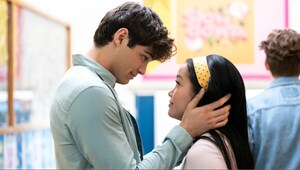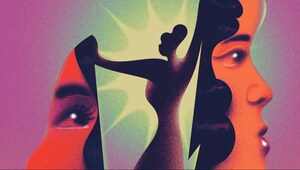Is Instagram Making Fashion More Diverse?
"When you upload a picture to your feed, are you trying to stand out or blend in?"

Over the last few years, the fashion industry has made undeniable progress in increasing the amount of diversity represented on runways and in stores.
From Rihanna's inclusive Savage x Fenty revolution (which sees women of all shapes, sizes and abilities proudly walk the catwalk during fashion week), to brands like ASOS (who flat-out refuse to edit models' 'back rolls' out of their stock imagery), diversity is no longer just a buzzword that gets thrown around willy-nilly, it's something brands are stopping and noticing. Why? Because we care. And we're not afraid to put our money where our mouths are.
Whether it's a sell-out bralette for big boobs, or Marks & Spencer's inclusive range of 'nude' stilettos, shoppers are reinforcing greater inclusivity on a daily basis.
With this wave of change comes an 'out with the old, in with the new' attitude, leading companies such as Victoria's Secret, who have found themselves in the spotlight on multiple occasions for a lack of diversity, to face a harsh reality - adapt or die.
Of course, while the industry is gradually changing for the better - with models, celebrities and customers alike calling out underrepresentation - we'd be kidding if we said there wasn't still a long way to go because there definitely is. So what's next, how can we continue to encourage this new wave of fashion?
Well, perhaps the question we should be asking is less 'how', but 'where'. As a hub of user-generated content, Instagram could offer part of the answer. Not only does the social media platform act as a springboard for smaller labels, who can instantly catapult into the limelight following one viral post by an A-lister, the nature of the app also opens up broader discussions around inclusion.
Models are now being cast on Instagram, while hashtags like '#representationmatters' and '#celebratediversity' are gaining momentum to the tune of half a million posts, and counting. So who better to chat to about Instagram's role and responsibility in promoting diversity than the brand's Head of Fashion Partnerships, Eva Chen?
"Nowadays diversity means so many different things to different people," explains Eva. "We’ve got ethnic and racial diversity but we also have body, size diversity, different ability diversity and now we’ve got age diversity as well." The important thing to remember about Instagram is that it is fundamentally different from the more traditional forms of media that many of us grew up with (television, radio and magazines etc). "One of the greatest things about Instagram is that it’s broken down a lot of barriers and allowed people to learn about a lot of the different opportunities with the fashion industry." In fact, it's never been easier for members of the public to create and disperse original content to a wide audience.
And with that newfound freedom comes new voices with different stories to tell. "There are people creating entire platforms on Instagram, like Jameela Jamil and her 'I Weigh’ series – there’s also a lot of original content and talent popping up on Instagram." Plus, in a space where popular opinion, AKA 'likes', reign supreme, Eva says that Instagram doesn't necessarily need to penalise brands for a lack of diversity, as the app lets users thumbs do the talking.
"What’s amazing is that the consumers and the industry now kind of expect it. If the brand doesn’t have any diversity on the runway, they call it out... It’s very clear to a brand, in the comments, if they’re not being inclusive. It’s all about community."
Of course, no discussion of Instagram and diversity can go by without acknowledging the role of influencers. While many 'grammers are transforming the face of fashion and beauty for the better, the influencer, for many, remains bound to a particular 'aesthetic': perfect blow-dry, great tan, bright white teeth - you know the look.
Then there's the influx of photo editing apps and filters, along with weekly celebrity Photoshop fails that seem to tell a different story. In this sense, you could be forgiven for wondering whether Instagram is actually promoting diversity, or inhibiting it. When you upload a picture to our feed, are you trying to stand out or blend in?
Interestingly, Eva notes, Instagram has seen a shift in the type of content users are publishing, favouring 'realness' over 'flawlessness'. "I feel like Photoshop has always existed... What we're seeing, though, is that there’s generally a move away in top accounts from overly curated, perfect, perfect, perfect avocado toast and marble countertops posts and the wind blowing in the hair wearing ridiculous shoes that no one can really wear on a cobblestone street. And this might be the effect of Instagram Stories, which half a billion people use, but it’s a little bit more real, with more voice and personality."
Now, I don't know about you but, in my own experience, I have found that my posts tend to get more engagement when they're coupled with a relatable self-deprecating caption instead of a one-word, ~artsy~ mood. "I was talking with the influencer Camille Charriere who’s half French and half English," Eva recalls, "and she was saying that one of her very highly engaged posts from last year was this crazy situation where she was in a leg brace or leg cast for a long period of time and she couldn’t understand why people always engage more with that content and it’s like ‘because you’re being real, it’s not just the glossy bits it’s the ups and the downs!'"
It's important to remember that, as widespread as Instagram is, it isn't the only party responsible for encouraging diverse content, we all are. Now, more than ever, there's an onus on us to discover, engage and support inclusivity across the industry. From following an-up-and-coming sustainable brands to posting encouraging comments on rising models' accounts, this is more than just a social media 'trend', it's a movement.
"Thankfully, I think it’s not a trend but here to stay," adds Eva. "No one is perfect and it’s not interesting – I can’t remember who said that quote, I think it was Grace Coddington, who said ‘perfect is boring’. But it kind of is, isn’t it? You want a sense of realness."
Amen to that.
more from Life

The finest eateries across Mumbai, Goa, Hyderabad, Bengaluru, Delhi, and Pune

Sex tips to keep in mind during this Mercury Retrograde

What is intuitive eating and how is it different from other diets?

What the first trip with your partner says about your relationship

Signs that you’re a bad packer on your holidays and how to avoid them

Lessons that my string of unhealthy relationships taught me

Everything you need to know about the "Who is Your Chicago?" trend

#AskTheTherapist: ‘Should I break ties with my toxic sister?’

9 new restaurants and menus to try on your next visit to Goa

Here’s how to tell if you’re in a rebound relationship
